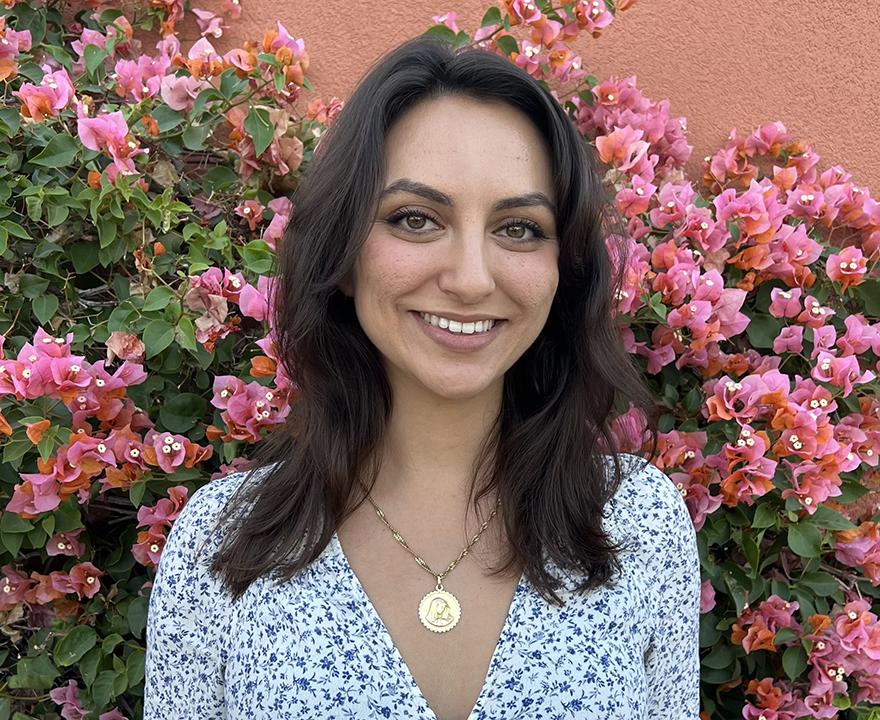Isaac earns UCI soc sci's Outstanding Service Award

Isaac earns UCI soc sci's Outstanding Service Award
- June 11, 2024
- Honor recognizes the poli sci grad student for exceptional contributions to the school community, including the intellectual growth of others
Mary Isaac, UCI political science Ph.D. candidate, is the recipient of the UCI School of Social Sciences Outstanding Service Award. The faculty-nominated award recognizes her contributions to the social sciences community, including the intellectual growth of others. Below, Isaac shares what motivates her work and what’s next on her pathway to a Ph.D.
Where did you earn your undergrad and master’s degrees? What made you decide to pursue your current field of study, and specifically at UCI? What interests you most about your work?
I earned my undergraduate degree at UCLA in international development studies, and my master’s at UCI in political science. I’m currently a Ph.D. candidate in political science at UCI planning to defend my dissertation in the fall.
I often observed differences in the political mentality between my family and that of others born in the United States. My family and community are mostly refugees, asylees, and descendants of genocide survivors. I decided to explore how their history with violence and marginalization impacted their political integration into a new country. UCI had the scholars whose work intersected most with mine, which made it easy to find the support I needed when developing my research questions and design. Additionally, the location of the school was very close to my family and community, which was a huge priority for me.
Tell us about your research. What problem will your findings help solve?
I explore the legacies of violence on political integration among Assyians and other indigenous groups that were forced to flee their homelands. In the existing literature, political behavior is rarely linked to pre-migration experiences, which I believe play a strong role in refugees’ political socialization, and therefore their behaviors in host-states. My findings encourage scholars and resettlement agencies to continue exploring the impact of pre-migration experiences on integration in order to best design policy and programming interventions that address each refugees’ specific needs according to their pre-arrival experiences. I hope that this research helps people and most importantly policy developers to stop viewing refugees as one and the same.
What organizations have funded your work? Tell us about any awards you’ve earned and activities you’ve been involved in while on campus.
The Center for Global Peace and Conflict Studies (CGPACS) has funded my work. I received the Outstanding Service Award from the UCI School of Social Sciences, the Best Graduate Student Paper Award from the International Studies Association-West Conference, was nominated for the Most Promising Future Faculty Award, was selected as an Educational Development Scholar and a Pedagogical Fellow with DTEI, and served as the Pedagogical Consultant to Political Science graduate students.
Who have been your faculty mentors while here, and what impact have they had on your graduate career?
I’ve been blessed with a community of mentors and supporters in my department, including my advisor Professor Sara Goodman, Professors Jeffrey Kopstein, Louis DeSipio, Erin Lockwood, and Kamal Sadiq. Each one always left their door open for conversation about my ideas, writing, research, and most importantly for emotional support throughout my graduate career. Danny Mann and Alex Bower at DTEI have also been incredible in supporting my pedagogical development and in fueling my passion for teaching. At the end of the day, the most important impact they all have had is their constant encouragement throughout. As much as I expected and wanted to believe, the path was never linear, and everyone listed here helped me navigate a new territory, whether it was a job application, a publication submission, or rerouting entire research plans because of a global pandemic.
What are your post-Ph.D. plans? How has UCI prepared you well for this role?
I am planning on a career within academia that allows me to exercise my student-centered teaching philosophy. Working with the Division of Teaching Excellence and Innovation for four years has prepared me immensely for this role. At DTEI I learned alongside a multi-discipline community of pedagogy-passionate people which helped me build my skills in inclusive curriculum design. I repeatedly found this to be the best learning environment for students. Whether I work as a Professor of Teaching, or as an Educational Developer at a university teaching center, I plan on helping students receive the best possible education using research-backed teaching tools.
Any unique life experiences that have guided your educational journey? Give us some background.
My family, like most Assyrians, are descendants of genocide survivors. I am the first generation of my family that has been able to focus on my own ambitions, as each before me was uprooted because of ethnic and religious persecution. Having the privilege to not have to worry about such threats, I was able to take time out of the typical job market to pursue a career in academia. I chose this path because I am very passionate about our people’s story and resilience, and wanted to do my part in sharing Assyrian narratives. My educational journey is guided by my family’s sacrifice and is a symbol of my appreciation for them, and Assyrians everywhere.
Any other tidbits you’d like to share?
A lot of my research involves discussing heavy topics in detail. My fieldwork with refugees was both enlightening and difficult to say the least. To stay balanced, I enjoy exercising my creative side by baking and decorating cakes, which you can find on @marys.baked.goodies. I also like to go outdoors as much as possible, whether it's taking my dog for a walk with my mom or exploring state parks in the Coachella Valley with my partner Ozzie.
-----
Would you like to get more involved with the social sciences? Email us at communications@socsci.uci.edu to connect.
Share on:


connect with us: